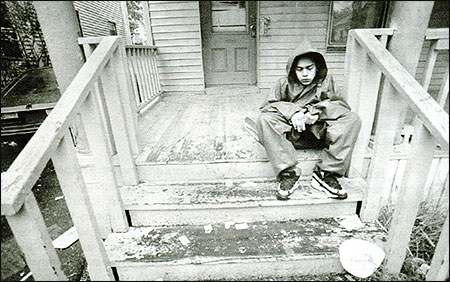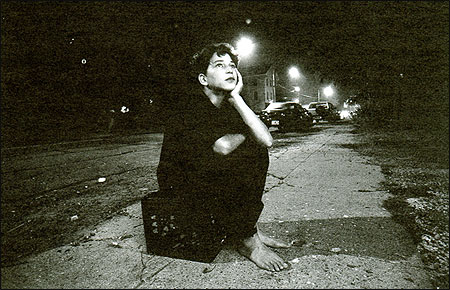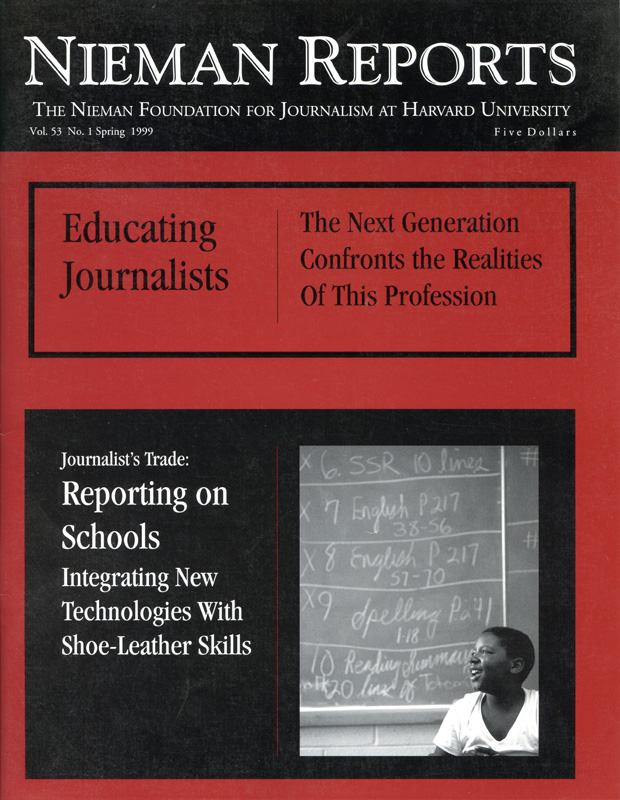
For two days in late September, Bebe sold the crack cocaine rocks known as “Cookies” in the pouring rain—cold and alone. While other kids were in school that morning, Bebe spent his day doing his job. Photo from Helen Ubinas’s series, “Mama can you save me? Children in Peril, Parents in a Desperate Struggle.” Photo by Brad Clift, The Hartford Courant.
My high school journalism teacher gave me one piece of advice before graduation: “Major in anything but journalism.”
In his defense, he had a point. Although it took an unproductive year studying political science at the University of Connecticut and a slew of jobs, including a stint as a fry cook at McDonald’s, to figure out exactly what was so right about his advice.
In time I realized he wasn’t warning me to steer clear of journalism. He was telling me that preparation for being a reporter would take many forms other than what I could find at a prestigious J-school with reputable professors and theoretical classes on the ethics of the profession I would eventually enter.
This is something I came to learn almost by accident. After asking “you want fries with that?” one too many times, the horrors of boring, low-paid jobs sent me running and screaming to the closest school that would have me. I ended up at Northern Essex Community College (NECCO) in Haverhill, Massachusetts, for no other reason than its close proximity to my home and my unwillingness to waste more time and money at an expensive four-year college. As things turned out, I couldn’t have picked a better school for me to attend at that point in my life.
Although NECCO lacked the big-name professors and programs other schools had, it offered me exactly what I needed to realize that writing was what I wanted to do for a living. The students, many who like myself had taken the scenic route through school, were motivated and passionate about their studies. The school newspaper’s student editors were a core group of eager and aspiring journalists who worked through many nights on diets of Coke and candy to get the paper out. The school newspaper consistently won awards, often beating out papers from more prestigious four-year colleges. The paper’s advisor, Joseph LeBlanc, pushed us to excel and was also a strong advocate of internships. His enthusiasm for them pushed me to want to do one myself.
Classes in journalism, which I also took, covered the basics—news and feature writing, copyediting. But it was the hands-on experiences both at the school paper and in my internships that was so valuable.
In time, I became Editor of the paper and, at the same time, worked on my internships as stringer for a Spanish-language publication and as a reporter at several community newspapers.
When it was time to move on to complete my four-year degree, I thought again of my high school teacher’s advice. But by then I was pretty certain that what he meant when he said not to major in journalism was that I had to make sure I could offer a prospective newspaper employer more than just a degree in journalism. So I majored in print journalism at Boston University and chose a concentration in Latin American studies.
Compared with NECCO, Boston University’s School of Communication offered a more diverse selection of journalism classes—ethics, communications law, the history of journalism. And while there were opportunities for hands-on experience like I’d had at NECCO—such as the school’s daily newspaper—there were also crowds of students waiting in line for an opportunity to write for it. As a transfer student with a limited amount of time, I couldn’t afford to get in the queue.
So I took the lessons I learned at NECCO—listening closely to the voice of my advisor there—and interned at as many papers as I could. I wrote a few articles for the school newspaper as well, but mostly I interned for Bay State Weeklies, writing stories for The Cambridge Chronicle, The Somerville Journal and The Watertown Press. By the time I left Boston University for a job at The Hartford Courant in 1994, I felt prepared for a career in journalism, and I knew I could offer my editors more than a degree acknowledging the courses that I’d passed.
My first year at The Courant was exactly what I expected from a newspaper job and from a career in journalism. I was assigned to report on Hartford’s neighborhoods, telling stories about people who before a daily section about the city was introduced a year earlier were rarely, if ever, represented in the paper, even though the newspaper carried the city’s name on its masthead. I had a supportive editor who also gave me feedback—something I later learned is a rare commodity in this business.
Now, nearly five years after I graduated from Boston University with that degree in journalism, I’ve had time to reflect on the lessons I learned along the way.
Above all, journalism school infused me with the enthusiasm for this profession that I think it takes to be a good reporter. My professors at both colleges were talented, supportive, creative individuals who were not only good teachers but also, very importantly, talented, working journalists. Because they kept themselves fresh about the profession by working in it as well as training us for it, their guidance was something I believed in. They prepared me well for the mechanics of working at a newspaper. They talked and taught leads, got us to be serious about meeting deadlines, even had us trot out our inverted pyramids.
In terms of course work, there were required writing, copyediting and ethics classes that ranged from practical to theoretical. But while the course work was both instructive and, at times, inspiring, it was also flawed in some areas. Even some of the basics weren’t quite there, as I’ve found out on the job. For example, some of the computers I learned on weren’t compatible with any of the systems at the papers I worked for. After talking to many colleagues, I learned it’s a problem that plagues journalism schools across the country and has for many years.
Copyediting was another basic course that received mixed reviews. I still use some of the lessons to edit today. However, advice I received about counting headlines by the point have gone unused, and even if someone asked me to do it today, I couldn’t remember how. “I would have rather used that class time learning more about editing and story structure,” a colleague said about her copyediting course at the University of Connecticut, where she graduated in 1993.
Then, there were the ethics courses that one of my more vocal cubicle mates deems “worthless.” I spent many hours in ethics classes talking about issues like privacy and giving lots of thought to the possibility of tainting situations by our mere presence. While at the time I found my ethics class worth the time I spent in it, I later realized we spent too much time talking about esoteric issues. Consequently I never gave much thought to the more practical and everyday situations I found myself in just a couple of years after graduation. Situations where, unlike class discussions, I was forced to act first and think later.
For example, a few years ago I did a story on a teenage drug dealer. At about 4 a.m., as I stood with this dealer on a street corner, a car drove up and its occupants were looking to buy drugs. The young boy handed them over, and the people then began to move away. The boy pulled out a gun and forced the couple who was in the car not only to pay for the drugs, but also to give him all of their money.
When all of this was happening, I didn’t have a chance to think about how my presence could influence this teenager’s actions. It was the next day when I asked myself whether, because I was there, he was trying to prove himself. Would he have done the same thing if I hadn’t been there? But by then it was too late for me to report that story differently. It was a reminder to me that discussions about the ethics and practice of journalism are important, but students ought to be aware that, as I found in that situation, reflective time is hard to come by. Instead, many times in the comfort of journalism classrooms split-second decisions made by working journalists are dissected and criticized in ways that make students think they will have the luxury of time to reflect about each and every one of their moves. They won’t.
Next to ethics, classes about communication law seem to be about the least favorite course offered at journalism schools. “Most of my studies involved memorization of law cases by now long since overturned in some superior court somewhere, I’m sure,” another journalist told me. Last I heard the law cases I memorized were still intact, but I can’t say I’ve ever felt affected by them or referred to any of them at my job, at least so far.
Without a doubt, internships remain the most valuable skill builder in my journalism education. And other journalists I’ve talked with agree. Perhaps this is because many of us were eager to actually do something rather than just study it. But there really is something to be said for dealing with real stories, real editors and real deadlines.
Speaking about what makes journalism training “real” leads me to another issue that is rarely talked about in classrooms. Anyone working in a newsroom can tell you that newsroom politics are a reality. From perceptions to misconceptions and everything in-between, newsrooms are the natural habitat of political animals. Yet to sit in journalism classes, one wouldn’t walk away with this impression, or with the armor one needs to enter the fray. Nor is the jargon of daily journalism talked about a lot in any helpful detail in classrooms. Whether the topic is budgets (and their impact on my ability to report a story the way I think it should be reported), or shrinking “inch counts” of stories, or “zoning issues” that impact my stories’ reach, I heard little about this back in the classroom but think about it a lot now.
But probably the most talked about issue in every newsroom today is the business of journalism and how corporate decision-making is impacting our jobs. Journalism professors never warned us about stories being done for the sake of advertising. There was little, if any, discussion about having a story held until it was properly advertised—until a team of advertisers and marketers created a brightly colored sign for the sidewalk newspaper boxes. No professor I had told me anything about having a story held for “sweeps”—a time when a newspaper’s circulation numbers are counted. Or about business reporters been told to write stories for the newspaper’s marketing brochures and annual reports.
I entered into journalism thinking of it almost as I would a marriage, as a partnership in which everyone involved is after the same things: truth, good writing, solid reporting and compelling stories. In short, the pursuit of excellence. But as happens in many personal relationships, partners sometimes grow apart, expectations change, needs get redefined, as do agendas.
I once worked on a story about a topic that had much relevance in the city our paper is located in. But because of an editor’s penchant for keeping things “positive” in his hometown, we were told to report this story from a city we did not normally report on. When the piece was published, that community regarded the article as negative and not surprisingly both the content and the fact that we’d left Hartford to do this story caused an uproar in that neighborhood.
Knowing what I now know about the business side of journalism, I’d ask my professors to teach want-to-be journalists not only how to write the best story they can, but also how to fight for the stories they believe are important to tell, for the integrity of their professional obligations, and for their words. Besides telling them about the rush you get as a journalist on deadline, I’d ask them to also prepare students for the times when the newness of it all wears off and you feel like a factory worker chugging out eight-inch stories that nine council members will read and likely complain about.
I’d ask them to role-play for these future journalists how to handle themselves the morning after someone decided to cut a paragraph for space or inadvertently inserted a mistake and the first phone call they received was from an irate reader.
I’d ask them to teach students how to stick in there when cynicism starts to creep in, when you think no one is listening or thinking about journalism or truth or the words that you just bled onto the page.
I’d ask them, even now, to help me get through the times when I try to remind myself why I got into this business to begin with. And then I’d ask them to keep advising me that I will find good reasons to stay. So far, their advice has proved wise and has stood the test of time.
It may sound a bit idealistic, but these lessons are just the sort of things I would have been eager to learn more about when I was in college. Maybe it takes being out in the field, working for a paycheck under real-life circumstances, to really absorb them. But from where I sit today, I think it couldn’t hurt—and it just might help—for a few of these contemporary journalism situations to find their way into the training that prepares us for this profession.

To live in the darkness, or to look to the future with hope? Otis sits on the edge: Will his mother’s lessons about responsibility win out over the streets of Fair Haven, where a blunt of marijuana or the quick sale of a $10 “rock” of crack cocaine offers immediate gratification? Late one night, Otis sits on a crate in front of his porch as his mother tells him what Fair Haven was like when she was a girl. She tells him she tried to leave the neighborhood once, but couldn’t. “I’d miss the excitement,” she says. Photo by Brad Clift, The Hartford Courant.
Helen Ubinas is a reporter at The Hartford Courant, where she covers the city. She has worked at The Courant since 1994, first covering Hartford’s neighborhoods, then reporting about the suburban town of Rocky Hill.



